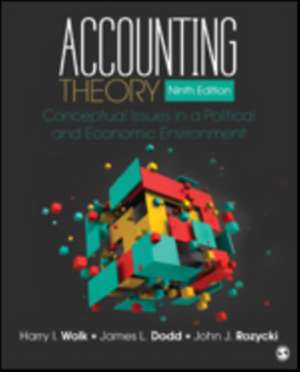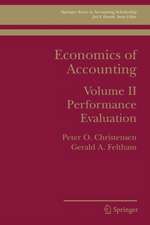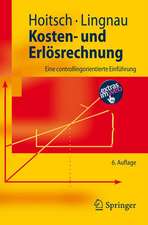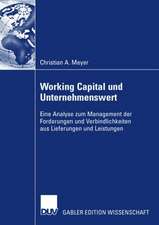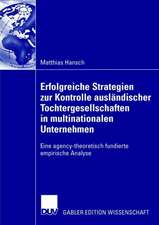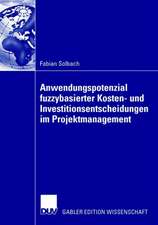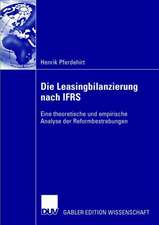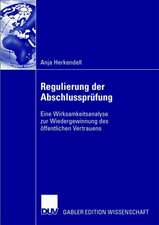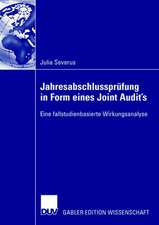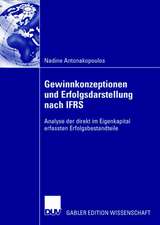Accounting Theory: Conceptual Issues in a Political and Economic Environment
Autor Harry I. Wolk, James L. Dodd, John J. Rozyckien Limba Engleză Hardback – 23 aug 2016
Ninth Edition of Accounting Theory: Conceptual Issues in a Political and Economic Environment a critical overview of accounting as a whole as well as touch on the financial issues in economic and political contexts, providing readers with an applied understanding of how current United States accounting standards were derived and where we might be headed in the future. Readers will find learning tools such as questions, cases, problems and writing assignments to solidify their understanding of accounting theory and gain new insights into this evolving field.
Preț: 1335.94 lei
Preț vechi: 1830.05 lei
-27% Nou
Puncte Express: 2004
Preț estimativ în valută:
255.67€ • 265.93$ • 211.07£
255.67€ • 265.93$ • 211.07£
Carte tipărită la comandă
Livrare economică 15-29 aprilie
Preluare comenzi: 021 569.72.76
Specificații
ISBN-13: 9781483375021
ISBN-10: 1483375021
Pagini: 672
Dimensiuni: 187 x 232 x 22 mm
Greutate: 1.27 kg
Ediția:Ninth Edition
Editura: SAGE Publications
Colecția Sage Publications, Inc
Locul publicării:Thousand Oaks, United States
ISBN-10: 1483375021
Pagini: 672
Dimensiuni: 187 x 232 x 22 mm
Greutate: 1.27 kg
Ediția:Ninth Edition
Editura: SAGE Publications
Colecția Sage Publications, Inc
Locul publicării:Thousand Oaks, United States
Cuprins
Chapter 1: An Introduction to Accounting Theory
Accounting Theory and Policy Making
The Role of Measurement in Accounting
Plan of This Book
Appendix 1-A: Valuation Systems
Chapter 2: Accounting Theory and Accounting Research
Accounting Research and Scientific Method
Is Accounting an Art or a Science?
Directions in Accounting Research
A Scientific Revolution in Accounting?
Chapter 3: Development of the Institutional Structure of Financial Accounting
Accounting in the United States Prior to 1930
Formative Years, 1930-1946
Postwar Period, 1946-1959
Modern Period, 1959 to the Present
Chapter 4: The Economics of Financial Reporting Regulation
The Case for Unregulated Markets for Accounting Information
The Case for Regulated Markets for Accounting Information
Imperfections of Accounting Regulation
The Regulatory Process
Economic Consequences of Accounting Policy
Chapter 5: Postulates, Principles, and Concepts
Postulates and Principles
Basic Concepts Underlying Historical Costing
Equity Theories
Appendix 5-A: The Basic Postulates of Accounting (ARS 1)
Appendix 5-B: A Tentative Set of Broad Accounting Principles for Business Enterprises (ARS 3)
Chapter 6: The Search for Objectives
ASOBAT
APB Statement 4
The Trueblood Committee Report
SATTA
User Objectives and User Diversity
Chapter 7: The FASB’s Conceptual Framework
The FASB’s Conceptual Framework
The Conceptual Framework as a Codificational Document
Empirical Research on the Conceptual Framework
Assessing the Conceptual Framework
Chapter 8: Usefulness of Accounting Information to Investors and Creditors
Earnings, Dividends, and Stock Prices
Residual Income Models
Background on Risk and Return
Introduction to Capital Markets Research in Accounting
The Value of Accounting Information: Evidence From Return Data
The Value of Accounting Information: Evidence From Direct Valuation
Accounting Data and Creditors
Importance of Earnings Forecasting
Empirical Research and Standard Setting
Chapter 9: Uniformity and Disclosure: Some Policy-Making Directions
What Underlies the Choice Among Accounting Methods?
Uniformity
The Usefulness of Accounting Allocations
Disclosure
Improving Accounting Standards
Chapter 10: International Accounting
National Accounting Differences
International Harmonization of Accounting Standards
Chapter 11: The Balance Sheet
The Relationship Between the Balance Sheet and the Income Statement
Assets
Liabilities
Owners' Equity
Financial Instruments
Classification in the Balance Sheet
Appendix 11-A: A Simple Example of a Weather Derivative
Chapter 12: The Income Statement
Income Definitions
Revenues and Gains
Expenses and Losses
Future Events and Accounting Recognition
Current Operating Versus All-Inclusive Income
Nonoperating Sections
Earnings per Share
Special Subjects Concerning Income Measurement
Earnings Management
Income Statement Developments
Chapter 13: Statement of Cash Flows
The Statement of Changes in Financial Position
The Motivation for a Cash Flow Statement
Requirements of the Cash Flow Statement
Classification Problems of SFAS No. 95
Analytical Usefulness of the Cash Flow Statement
Cash and Funds Flow Research
Improving the SCF
Chapter 14: Income Taxes and Financial Accounting
Income Tax Allocation
The Asset–Liability Orientation of SFAS No. 109
Empirical Research on Income Tax Allocation
International Accounting Standards (IAS)
Improving Accounting Standards
Chapter 15: Pensions and Other Postretirement Benefits
Overview of Pension Plans
Development of Pension Accounting Standards
Postretirement Benefits Other Than Pensions
International Accounting Standards (IAS)
Improving Accounting Standards
Appendix 16-A: Illustration of Pension Expense Determination and Actuarial Funding Methods
Chapter 16: Leases
The Lease Contract
The Evolution of Lease Accounting Standards
FASB and IASB Joint Exposure Draft on Accounting for Leases
Improving Accounting Standards
Chapter 17: Intercorporate Equity Investments
Relevant Circumstances
Consolidation
The Equity Method
The Fair Value Method
Defining the Reporting Entity
Translation of Foreign Operations
IASB Standards
Improving Accounting Standards
Appendix 17-A: Special Purpose Entities, Variable Interest Entities, and the Downfall of Enron
Accounting Theory and Policy Making
The Role of Measurement in Accounting
Plan of This Book
Appendix 1-A: Valuation Systems
Chapter 2: Accounting Theory and Accounting Research
Accounting Research and Scientific Method
Is Accounting an Art or a Science?
Directions in Accounting Research
A Scientific Revolution in Accounting?
Chapter 3: Development of the Institutional Structure of Financial Accounting
Accounting in the United States Prior to 1930
Formative Years, 1930-1946
Postwar Period, 1946-1959
Modern Period, 1959 to the Present
Chapter 4: The Economics of Financial Reporting Regulation
The Case for Unregulated Markets for Accounting Information
The Case for Regulated Markets for Accounting Information
Imperfections of Accounting Regulation
The Regulatory Process
Economic Consequences of Accounting Policy
Chapter 5: Postulates, Principles, and Concepts
Postulates and Principles
Basic Concepts Underlying Historical Costing
Equity Theories
Appendix 5-A: The Basic Postulates of Accounting (ARS 1)
Appendix 5-B: A Tentative Set of Broad Accounting Principles for Business Enterprises (ARS 3)
Chapter 6: The Search for Objectives
ASOBAT
APB Statement 4
The Trueblood Committee Report
SATTA
User Objectives and User Diversity
Chapter 7: The FASB’s Conceptual Framework
The FASB’s Conceptual Framework
The Conceptual Framework as a Codificational Document
Empirical Research on the Conceptual Framework
Assessing the Conceptual Framework
Chapter 8: Usefulness of Accounting Information to Investors and Creditors
Earnings, Dividends, and Stock Prices
Residual Income Models
Background on Risk and Return
Introduction to Capital Markets Research in Accounting
The Value of Accounting Information: Evidence From Return Data
The Value of Accounting Information: Evidence From Direct Valuation
Accounting Data and Creditors
Importance of Earnings Forecasting
Empirical Research and Standard Setting
Chapter 9: Uniformity and Disclosure: Some Policy-Making Directions
What Underlies the Choice Among Accounting Methods?
Uniformity
The Usefulness of Accounting Allocations
Disclosure
Improving Accounting Standards
Chapter 10: International Accounting
National Accounting Differences
International Harmonization of Accounting Standards
Chapter 11: The Balance Sheet
The Relationship Between the Balance Sheet and the Income Statement
Assets
Liabilities
Owners' Equity
Financial Instruments
Classification in the Balance Sheet
Appendix 11-A: A Simple Example of a Weather Derivative
Chapter 12: The Income Statement
Income Definitions
Revenues and Gains
Expenses and Losses
Future Events and Accounting Recognition
Current Operating Versus All-Inclusive Income
Nonoperating Sections
Earnings per Share
Special Subjects Concerning Income Measurement
Earnings Management
Income Statement Developments
Chapter 13: Statement of Cash Flows
The Statement of Changes in Financial Position
The Motivation for a Cash Flow Statement
Requirements of the Cash Flow Statement
Classification Problems of SFAS No. 95
Analytical Usefulness of the Cash Flow Statement
Cash and Funds Flow Research
Improving the SCF
Chapter 14: Income Taxes and Financial Accounting
Income Tax Allocation
The Asset–Liability Orientation of SFAS No. 109
Empirical Research on Income Tax Allocation
International Accounting Standards (IAS)
Improving Accounting Standards
Chapter 15: Pensions and Other Postretirement Benefits
Overview of Pension Plans
Development of Pension Accounting Standards
Postretirement Benefits Other Than Pensions
International Accounting Standards (IAS)
Improving Accounting Standards
Appendix 16-A: Illustration of Pension Expense Determination and Actuarial Funding Methods
Chapter 16: Leases
The Lease Contract
The Evolution of Lease Accounting Standards
FASB and IASB Joint Exposure Draft on Accounting for Leases
Improving Accounting Standards
Chapter 17: Intercorporate Equity Investments
Relevant Circumstances
Consolidation
The Equity Method
The Fair Value Method
Defining the Reporting Entity
Translation of Foreign Operations
IASB Standards
Improving Accounting Standards
Appendix 17-A: Special Purpose Entities, Variable Interest Entities, and the Downfall of Enron
Notă biografică
Descriere
This updated Ninth Edition of Accounting Theory: Conceptual Issues in a Political and Economic Environment continues to be one of the most relevant and comprehensive texts on accounting theory. Authors Harry I. Wolk, James L. Dodd, John J. Rozycki provide a critical overview of accounting as a whole as well as touch on the financial issues in economic and political contexts, providing readers with an applied understanding of how current United States accounting standards were derived and where we might be headed in the future. Readers will find learning tools such as questions, cases, problems and writing assignments to solidify their understanding of accounting theory and gain new insights into this evolving field.
